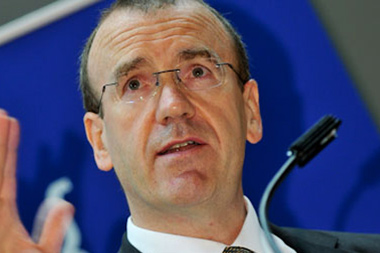Leahy takes aim at Tesco talent management

Former CEO accuses successor of allowing staff with valuable leadership abilities to go down the drain
Jermaine Haughton
Retail chain Tesco’s current slump has sparked a war of words between the firm’s two, most-recent CEOs, Sir Terry Leahy and Philip Clarke – with the former accusing the latter of squandering vital leadership talent. During his 14-year reign, Leahy transformed the brand into Britain’s biggest supermarket. In his view, the company’s current difficulties have stemmed from poor management – itself the result of shedding core expertise.
Speaking in last night’s edition of flagship BBC factual programme Panorama, Leahy – who stepped down from the Tesco helm in 2011 – said: “People tried very hard to do the right thing [but] it clearly has not worked. In the end, that’s a failure of leadership – not a failure of the business, not a failure of the people who work hard every day in the business. When you’re the CEO, if it goes well, you get credit. If it doesn’t go well, you must take responsibility. Phil Clarke has taken that responsibility and paid the price with his job.”
For Leahy’s money, the succession process to replace him was at fault: following years of steady leadership, the company took an abrupt nosedive. One particularly worrying outcome of Clarke’s appointment, Leahy noted, was a “brain drain” of vastly experienced, high-level staff, who left the company during Clarke’s tenure.
“I think [the firm] lost too much talent,” he told the programme. “It’s a big company, Tesco – and also very empowered. People were given responsibility and trusted to get on with their jobs, so there was a big team of experienced leaders. And too many of those were allowed to go in too short a period of time, so there was a shortage of experience – the kind of experience you need to carefully navigate a business like Tesco through this very turbulent and difficult period of this long, long recession, with these changes in the structure of retailing taking place.”
Tesco would not be alone in facing challenges when it comes to finding and retaining top management talent, judging by CMI’s recent Future Forecast report. Its survey of 1,200 managers found that 72% encountered problems in 2014 with recruiting the talent they needed – a 6% rise on the previous year. Yet less then a third (30%) considered developing the next generation of managers and leaders from among their existing staff a priority which could give rise to retention problems, suggesting that appropriate training schemes are a must to avoid the type of talent drain that Leahy has alleged.
However, the long-term effects of Leahy’s spell at the firm have also come in for criticism. Many of the stores that are now being closed by current boss Dave Lewis were initially proposed or opened in the Leahy era, while the company’s move to pull out of failing US venture Fresh & Easy cost it £1.2 billion. With those issues in mind, Clarke has, in turn, accused Leahy of running the core, UK business “too hot” – a phrase defined as using cost savings to short up profits through the recession, while starving stores of investment.
In a statement issued to the BBC, Clarke said: “Although the company had enjoyed unprecedented success in the past, it was plainly the case when I took over Tesco in 2011 that it faced a number of critical challenges that had been building for some time. In bringing about business and cultural change within the company, inevitably some executives who were not considered to have a role to play in the future of the business were let go. There are many others who remain silent out of loyalty to the company and who would describe Tesco under my leadership very differently.”
In response, Leahy told Panorama: “The acid test is: are you attracting customers? Yes we were – more customers each year. Were sales growing? Yes they were. Tesco is the biggest. People expect it to have the best prices. I think that some of that trust has been eroded, which has meant that people have shopped around.”
History may yet demonstrate that Clarke’s approach was too respectful of his predecessor’s, leaving him to walk in Leahy’s shadow – much as other successors in high-profile appointments have in recent years. One prime example of teething troubles blossoming into a full-blown crisis is David Moyes’ appointment as Manchester United manager following the reign of Sir Alex Ferguson – although Moyes’ period in charge was noted for differing starkly to Ferguson’s steely control.
Meanwhile, current Tesco chief Lewis is not labouring under the same worries, and has worked rapidly to put his stamp on the company – closing dozens of stores, selling off peripheral businesses and putting leaders at the firm through a reality-check boot camp to better understand its customers.
Click here for CMI’s resources on talent management.
Image of Sir Terry Leahy courtesy of the Wikimedia Commons.

Press & Media Enquiries
For more information or to request interviews, contact CMI's Press Team on 020 7421 2705 or email press.office@managers.org.uk


